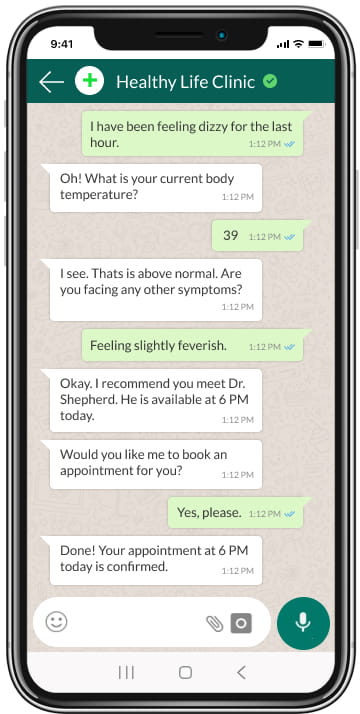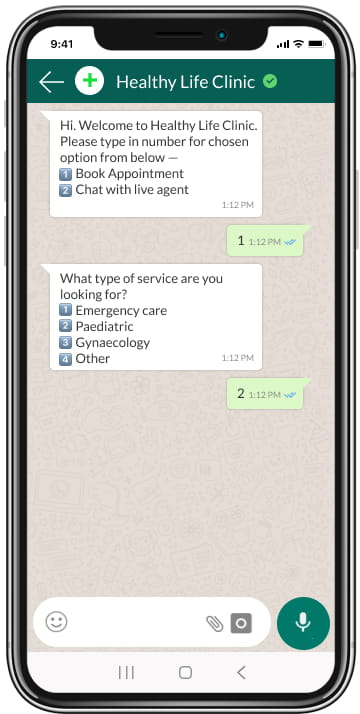How WhatsApp is Redefining Healthcare Delivery in the Covid Era
The covid pandemic has sent the whole world hunkering down. People can’t step out of their homes for fear of contracting the virus, but they still need access to healthcare. More so, the elderly patients living with chronic ‘but under control’ conditions that need care delivered to them at their homes. Add to that the ever-growing number of covid patients who are advised to isolate at home and receive care remotely. This has put tremendous pressure on an already over-burdened healthcare system and compelled healthcare providers to deploy tech-driven solutions that deliver care at people’s doorsteps. Even before the pandemic, there was an acute shortage of medical professionals in most of the developing nations.
Consider the disparity in the number of doctors per 10,000 people in these countries:
| Country | Year | No. of Doctors per 10,000 People |
|---|---|---|
| Senegal | 2019 | 0.88 |
| South Africa | 2019 | 7.92 |
| India | 2019 | 9.28 |
| Brazil | 2019 | 23.11 |
| United Kingdom of Great Britain and Northern Ireland | 2019 | 58.23 |
| Italy | 2019 | 80.13 |
With millions now stricken with covid, these numbers have only plummeted further. And even countries with the best healthcare systems, say Italy, have been overwhelmed. So it’s no wonder that the global healthcare industry has turned to online services to accelerate healthcare delivery remotely, with significant benefits for both patients and providers. Leveraging disruptive technologies that enable tele-consultation, many healthcare providers are reaching out to hundreds of thousands of patients they may have not have been able to help physically.
Likewise, pharmacies are also delivering medicines to the homes of the ailing based on prescriptions shared online.
The Rise of Instant Messaging in Healthcare
Even just a decade ago, healthcare hadn’t woken up to the immense potential of digital technologies in care delivery. These days though, technology drives many of healthcare’s basic services, from online consultations, digital therapies, and connected drug delivery to clinical trial monitoring. And particularly exciting is how conversational messaging technologies, a big hit in sectors like retail, BFSI, food & beverage, and auto, are now being used to provide patient-facing solutions — be it in the areas of medicine adherence, virtual care, health alerts, appointment scheduling, and so on.
The World Health Organization (WHO) launched its health alert on WhatsApp in March 2020. Doctors at NHS now widely share information on covid and other medical conditions with patients on WhatsApp business accounts, and even use it to communicate with other doctors. In Brazil, almost 90 percent of doctors communicate with their patients over WhatsApp. Hospitals across the world are encouraging the use of video consultations over WhatsApp to limit in-person clinic visits. As per recent analysis by Ernst & Young, the number of patients consulting doctors virtually has risen from 28 percent in pre-covid times to 64 percent post-covid.
Want to Explore How WhatsApp Can Help You Redefine Patient Care? Get in Touch
A Win-Win for Providers and Patients
Leveraging WhatsApp has resulted in enormous benefits for the healthcare system — not only has it provided fast and easy access to healthcare for patients, it has also freed up doctors to see more patients in a given day and reduced the overall cost of care. What’s more, it has helped hospitals minimize admissions through real-time symptom monitoring remotely and freed up beds for really critical patients, reducing overall mortality in the process. Using WhatsApp, millions of patients have been able to manage chronic conditions from the comfort of their homes.


A Quick Glance at How WhatsApp Can Support the Healthcare Industry
Appointment Management and Payments | Patients can book or reschedule first-time appointments or follow-up visits based on available time slots; they can make payments directly over the app. |
Online Consultations | Patients can chat with doctors directly, share information and photos related to health issues, and receive care in real time; they can take valuable second opinions by sharing scan reports with other doctors to arrive at an accurate diagnosis. |
Clinical Trials Monitoring | Pharma players can leverage automated communication possible through WhatsApp Business API to share personalized updates on a person’s eligibility for a trial, and enable participants to report symptoms and side effects continuously, significantly reducing drop-out rates. |
Sharing Health Alerts | Healthcare providers can disseminate information ranging from general FAQs to personalized alerts related to eligibility for receiving vaccinations, share information on following COVID-19 protocols, and more on WhatsApp. |
Tracking Patient Progress | WhatsApp enables care centers to effectively communicate with patients enrolled to various digital therapy programs. Using the app, centers can remind patients to take medicines on time, offer training on managing pain symptoms, etc., which results in better patient outcomes. |
Sharing Lab Reports and Prescriptions | Labs can share non-sensitive patient reports on the app as WhatsApp allows sharing of images, pdfs, and other formats of files; they can also forward prescriptions to ensure ease of purchase when stocks run low, which saves time and effort. |
Facilitating Collaborative Research | Doctors can create WhatsApp groups specific to their disciplines and share research findings among themselves to facilitate collective learning. They can quickly form emergency surgery groups to communicate better in times of emergencies. |
Delivering Online Pharmacy Services | Elderly patients can order specialty medicines for chronic diseases such as diabetes, BP, etc. on WhatsApp itself. They can simply share prescriptions with pharmacies and schedule medicine deliveries to their homes. |
Connecting With Different Industry Stakeholders | Sales staff of medical device manufacturing companies and pharma companies can communicate directly with pharmacies, clinics, and hospitals to collect purchasing requirements, conduct follow-ups about re-stocking of medicines, and share invoices and contracts via two-way communication on WhatsApp. |




![[photo]](https://edna.io/wp-content/themes/edna/images/authors/rajrupa-ghoshal.jpg)
![[icon]](https://edna.io/wp-content/themes/edna/images/authors/ico-linkedin.svg)